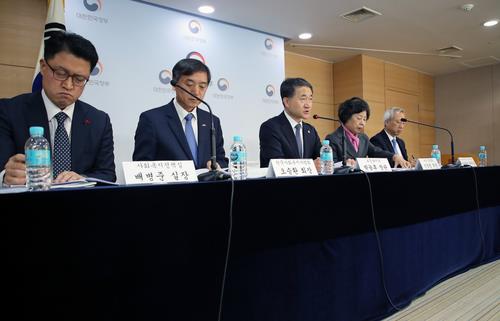The Ministry of Health and Welfare offical says
The government on Nov. 20, 2018 announced a blueprint that centers on providing better treatment and caregiving to seniors in their homes amid a rapidly aging population.
Under the "Community Care" policy spearheaded by the Ministry of Health and Welfare, the government will establish a working system by 2025 so that seniors will be looked after more thoroughly.

"Seoul will come up with a system in which older people can spend their later years within their communities through such policies as housing support and visits by doctors and home care visits," Health and Welfare Minister Park Neung-hoo told reporters in Seoul.
The plan comes as Asia's fourth-largest economy is projected to become a super-aged society in 2026, with 20 percent of the population expected to be over 65. The country became an aged society in 2017, with more than 14 percent of its 50 million population aged 65 or older.
According to a ministry survey last year, 57.7 percent of the people viewed as seniors said they would like to spend the remainder of their lives at the place where they were living.
Reflecting such wishes, the government will push ahead with policies centered on older people so they can find affordable homes. This involves offering around 40,000 public rental houses by 2022.
The houses will be located very close to public health care and caregiving centers, officials said.
The ministry said 5,000 of them will be called "public silver houses," which will first be provided to low-income older people living alone.
The houses will be equipped with various safety features like automatic gas cutoffs and movement sensors, officials said.
The government said it will also increase the number of older people receiving home visits from doctors and nurses from 1.25 million this year to 3.93 million by 2025.
In order to meet the requirements, the government will build community health care centers at every local government building across the country, officials said.
Park stressed that Community Care policy will not only be implemented at the central government level but also followed by local governments across the country.
The ministry then said it will expand medical care services for elderly patients, so they can be more easily transferred to local hospitals if the need arises.
Moreover, the government will establish a system connecting major general hospitals and local governments so that patients can be better taken care of by a team of social workers even after they are discharged.
The ministry said it will expand home care services for aged people with disabilities as they will need extra day-to-day assistance to carry on with their lives.
The government plans to increase the ratio of aged people being covered by life care insurance to be on par with the Organization for Economic Cooperation and Development (OECD) average. Currently, 580,000 people, or eight percent of the senior population benefit from the long-term life care insurance. (Yonhap)

